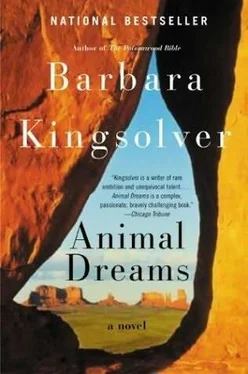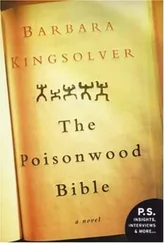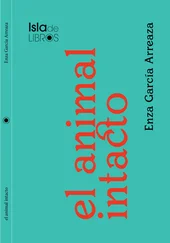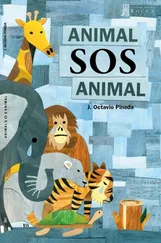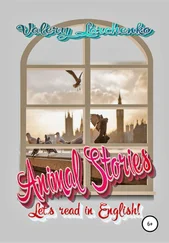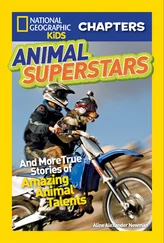I ducked into a coffee shop that had decent coffee and wonderful croissants. As I sat blowing into my cup I realized I was looking around to see who was there-a habit I must have picked up in Grace, where you looked at people because they were all identifiable.
A man at a table very close to my elbow kept looking at my legs. That’s another thing you put up with when you’re tall-men act like you’ve ordered those legs out of a catalogue. I crossed them finally and said, “See, look, I’ve got another one just like it.”
He laughed. Amazingly, he wasn’t embarrassed at all. I’d forgotten how the downtown scene could be-people cultivating weird-ness like it was a disease or a career. He had a neatly trimmed beard and was extremely handsome. “How Emma Bovary,” he said.
I smiled. “You seem to have lost your syntax. Perhaps you’re in the wrong place. The Café Gertrude Stein is down the street.”
“Well,” he said. “Well well well. Perhaps you could provide me with some context. Do you have a name?”
“Cosima. It means Order in the Cosmos.”
“Cosima, my love, I’m in desperate need of order. If you have the New York Times in your bag there, I’d be willing to marry you.” I had the New York Times.
“I’m not in the habit of marrying strangers,” I said. I was suddenly disgusted with what I was doing. I’d go anywhere Carlo wanted, I’d be a sport for my students in Grace, I’d even tried to be a doctor for Doc Homer, just as I’d humiliated myself in the old days to get invited to birthday parties. If I kept trying to be what everybody wanted, I’d soon be insipid enough to fit in everywhere. I grabbed my bag and stood up to go. I told the man, “You don’t have the slightest idea who I am.”
The second night in Tucson I slept like a child, so drenched in sleep that when I woke up I didn’t know where I was. For a minute I lay lost in the bed, trying slowly to attach the physical fact of myself to a name, a life, a room in a house within a larger place. It was a frightening moment, but nothing new to me, either. So rarely in my life did I truly surrender to sleep that it took an extra effort for me to pull myself out. It felt like slogging on my elbows up a riverbank.
Carlo wasn’t in bed with me, of course; he’d skirted the awkward issue by saying he had a weird shift and might as well sleep on the sofa and not disturb anybody. But he’d had plenty of opportunities in the past to see me wake up confused. He always claimed there was something wrong with the electrical current in the temporal lobes of my brain. He said that explained why I couldn’t remember parts of what I’d lived through, and remembered other parts that I hadn’t. I was attracted to easy answers but mistrusted them too. Carlo’s specialty was the nervous system; he tended to think all human difficulties were traceable to neural synapses gone haywire. And I feared-no, I knew-what was wrong with me was more complicated than what’s wrong with a badly wired house.
Carlo was already gone but left a note, saying to think very seriously about Aspen. It sounded like a joke, put that way, but I folded the note and stuck it in my suitcase. Emelina was cheerful at breakfast. She’d sensed the previous day that my mood had turned black and blue, but she was intent on our having a vacation even if neither of our hearts was really in it. We’d gone to the movies and eaten at McDonald’s, which by Grace standards is the high life. We ordered Happy Meals; she was collecting small plastic replicas of impossible-looking vehicles for her boys. We had enough now to go home.
On our way out of town she insisted that we stop at an obvious tourist trap called Colossal Cave. It was colossal by no means, but a cave. We stood a long time in the dim entry while the guide in a Smokey Bear hat made small talk, hoping for a bigger crowd. There were only seven or eight of us. It must be hard to give your whole spiel to a group that wouldn’t even make a baseball team or a jury.
“So when’s Loyd get home?”
“Friday,” I said.
“That switch-engine deal gets long, doesn’t it?”
“It never seems to bother you,” I said, although I had an acute memory of the night I’d glimpsed them making love in the courtyard.
“Mm,” she said.
“Then again, Loyd might be making the whole thing up. He’s probably got a sweetie in Lordsburg.” Emelina looked startled. “I’m kidding,” I said.
“Don’t say stuff like that. Knock on wood.” She thumped the side of her head.
“Well, it’s occurred to me to wonder why Loyd wasn’t married or anything when I came along. If he’s such a hot item.”
“He was.”
“Married?”
“No. Seeing somebody, but not that serious. Definitely not married. He was once, awhile back, for a year or two, I think. No kids. He didn’t tell you?”
“I never asked.”
“Her name was Cissie. She didn’t deserve him.” Emelina peeled off her Dallas Cowboys sweatshirt (actually John Tucker’s). It was cave temperature down there, only 55 degrees but much warmer than outside, where it was predicted to drop below freezing that night. A woman near us was wearing a mink coat.
“I wasn’t about to leave it in the car,” she said to us, without provocation.
Loyd had never mentioned even a large personal fact like a previous marriage, whereas this woman in mink felt compelled to explain herself to strangers. That’s how it is: some people are content to wait till you ask, while others jump right in with the whole story. It must have to do with discomfort. Once while I was waiting to file off an airplane, a grandmother came down the aisle carrying a doll in one arm and a little boy in the other, and she actually took the time to explain to us all as she passed, “The doll is his sister’s, she’s up ahead.” I could relate to the urge. I remembered all my tall tales to strangers on buses. I was explaining in my own way; making things up so there would be no discussion of what I was really.
At last our guide spoke some encouraging words and the little crowd followed him down into the cave. As he walked he told us about an outlaw who’d ducked in her to hide his loot, back in the days of Jesse James, and apparently had never come out. This was meant to give us a thrill of fear, but it seemed more likely that there was a back door somewhere and the bad guy got away with the money. That’s how things go. I still believe Adolf Hitler is living in the South Pacific somewhere with sanded-off fingerprints and a new face, lying on a beach drinking mai-tais.
Emelina hadn’t seen a cave before and was very impressed. There were delicate stalactites shaped like soda straws, and heavy, hooded stalagmites looming up from the cave floor. She kept pointing out formations that reminded her of a penis.
“You’ve only been away from home three days,” I whispered.
“I didn’t say it looked like J.T.’s,” she whispered back.
The sound of trickling water was everywhere, even over our heads. I shivered to think how many tons of rock and dirt were up there above us. I’d forgotten that caves were not my favorite thing.
The highlight of the tour was the Drapery Room, which was admittedly impressive in size. The guide pointed with his flashlight to various formations, which had names like Chief Cochise and The Drapes. The walls and ceiling glittered with crystallized moisture.
Then, for just a minute-they always have to do this-he turned off the lights. The darkness was absolute. I grabbed for Emelina’s arm as the ceilings and walls came rushing up to my face. I felt choked by my own tongue. As I held on to Emelina and waited for the lights to come back on, I breathed slowly and tried to visualize the size of the room, the distance between myself and the roof that I knew was there. Instead I saw random images that didn’t help: Emelina collecting the little fast-food cars for her boys; the man in the café who’d suggested I marry him. And then while we all still waited I understood that the terror of my recurring dream was not about losing just vision, but the whole of myself, whatever that was. What you lose in blindness is the space around you, the place where you are, and without that you might not exist. You could be nowhere at all.
Читать дальше
